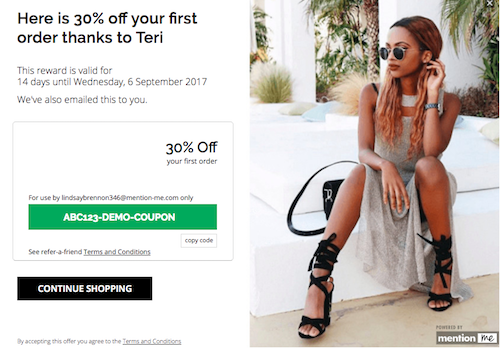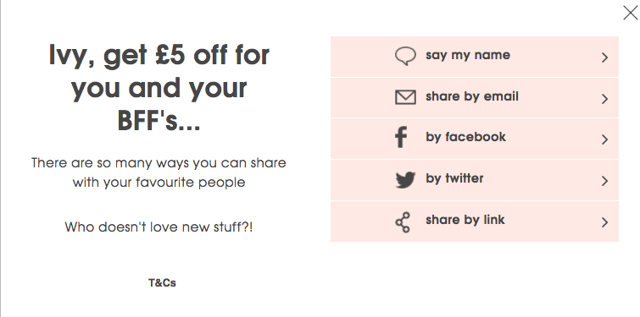Referral Marketing for Gen Z: Strategies That Work

Running referral programs for 500+ brands gives us some fascinating insight into the psychology of referral for different demographics.
Having built a reputation as experts in fashion referral marketing, through our work with brands like Asos, Michael Kors, Farfetch, and PrettyLittleThing, we have seen marked differences in what drives these customers to share a brand and what will, in turn, lead their friends to take up a recommendation.
Much has been written about Generation Z (also known as Centennials or Post-Millennials), how they communicate and their demand for relevancy and authenticity.
On the surface these ideals suggest that Gen Z are ripe for referrals; after all a recommendation from a friend is much more authentic than traditional advertising and the increasingly hyped influencer marketing.
But we wanted to dig beneath the surface and see what really makes them tick when it comes to advocating a brand to their friends or taking up a referral offer.
We uncovered some surprising insights. But first, let’s unpack the relationship between Gen Z and marketing.
How does Gen Z affect fashion marketing?
When it comes to fashion, Gen Z is less loyal than older consumers and more open to discovery. In fact, they’re 15% more likely than older shoppers to explore different clothing brands, with just 29% of their wardrobe coming from a single label (compared to 52% of over-50s), according to the Business of Fashion–McKinsey State of Fashion 2025 report.
Loyalty may look different for Gen Z, but that doesn’t mean it’s absent. It’s built through connection, cultural relevance, and a sense of belonging.
Affordability is also central to their buying decisions — 70% of UK Gen Z prioritise price, and 40% of US Gen Z are spending less on apparel. Rather than seeing this as a constraint, brands should see this as an opportunity to position their brand as a great-value, on-trend choice.
Just look at the rise of ‘dupe culture’ — Gen Z is embracing and flaunting knock-offs or alternatives to premium fashion brands. In doing so, they’re showing that you don’t need to break the bank to express your individuality, and brands should lean into this when marketing to younger consumers.
If you’re targeting Gen Z with referrals, a referral marketing platform ensures you can track engagement, performance, and conversions with the clarity needed to refine your approach.
What does Gen Z expect from brands?
For Gen Z, buying from a brand isn’t just a transaction — it’s a way to express identity and belonging. Their expectations go far beyond product specs; it’s about how a brand makes them feel and the values it embodies.
Community = Trust
According to the 2025 Sprout Social Index, 92% of Gen Z say a brand’s community shapes their feelings towards it, and 83% say being part of that group increases their trust in the brand — significantly more than older demographics.
Values matter
Nearly 80% of Gen Z consumers see brands as inherently political, and 58% say if a brand doesn't speak up on societal issues, they assume it's hiding something.
Inclusivity goes deeper
Around 77% of Gen Z say they feel better about a brand that actively supports gender equality on social media, while 62% believe increased diversity genuinely benefits society.
Real-world connection still wins
Micro-communities and in-person gatherings are becoming the new influencers. Brands partnering with community event leaders — from run clubs to creative workshops — are tapping into deeper trust and cultural capital.
How do fashion brands communicate their purpose to Gen Z?
For Gen Z, a brand’s purpose isn’t something they’ll discover buried in an “About Us” page - it needs to be visible, consistent, and woven through every touchpoint. This generation is looking for proof, not promises, so the way you communicate matters as much as what you stand for.
Make community your channel
Don’t just talk at Gen Z — create spaces where they post, talk, and collaborate with you. In-app groups, Discord servers, niche Instagram accounts, and micro-events can become two-way platforms where your values are lived, not just stated.
Show your values through people, not press releases
Showing diversity in your design teams, leadership, and collaborators demonstrates that inclusivity is a core part of your culture, not just a marketing strategy.
Use cultural relevance as a storytelling tool
Partner with of-the-moment figures who authentically align with your brand’s stance — not just celebrity faces but community voices, stylists, and creatives who carry credibility in their circles.
Bridge online and offline experiences
From local pop-ups to workshops, use events as living expressions of your values. The conversations and content they generate on social platforms can have more impact than the event itself.
Integrate purpose into advocacy
Make your referral and loyalty programs reflect your mission — from exclusive drops tied to charitable initiatives to rewards for recycling old garments — so that every share reinforces what you stand for.
Key insights for referral marketing to Gen Z
From our work with fashion brands, we’ve unearthed several interesting behaviours and preferences that shape how Gen Z engages with referrals. These insights highlight where brands can adapt their programs to better capture attention and drive meaningful action.
Payday countdown
Many referral offers include a voucher validity date to drive a sense of urgency and encourage redemption.
We examined the Psychology of Persuasion in a previous post and highlighted that scarcity can be a great “weapon of influence” to drive referral, with time limited offers a common approach which works well for many brands.

However some recent research we carried out with customers of our fast fashion brands revealed that in contrast to this, they were instead turned off by short validity periods for vouchers. Why is this?
For a demographic where money can be tight, payday is often a crucial driver of purchasing behaviour. A time limited offer might end before payday, which at best might limit conversion and at worst might instil negative feelings towards the brand.
Key Takeaway
For referral success in the fast fashion brands then, our research would suggest longer redemption periods for optimum results.
It's personal
Another trend that our research highlighted, is that for Generation Z relationships are run on a first name basis.
Our technology enables friends to claim their referral offer by entering their referring friends name into the checkout to claim their referral reward. A great mechanism for capturing referral in real world conversations.
When we ran analysis on the names entered in the referral platform for our fast fashion brands, we found that in a higher proportion of cases, Generation Z’s tended to only enter the first name of their friends. Our technology, however sophisticated, struggles to match a referral to a customer based on the first name alone.
This phenomenon was significantly higher than for other brands, and so this research provided a really useful insight which helped us improve the messaging when capturing referral (ie - help us a little here; can you be a bit more specific?!) as well as supporting our stipulation brands need to continually test the order in which share mechanisms are promoted.
Key Takeaway:
Get to know your customers by looking at the data and then design a plan of tests and enhancements to help smooth out any bumps in their customer journey.
Sharing - It’s not just about social
If you’re running a referral program for a young fashion brand, it might be tempting to focus exclusively on social channels. But while social platforms are critical for discovery, they’re not the only — or even the most effective — ways to get Gen Z sharing and converting.
Email still earns its place. Recent Statista data shows that around 57% of Gen Z are happy to hear from brands via email, making it more than just a channel for older generations. In our own referral program results for fast-fashion brands, email consistently ranks among the top sharing and redemption methods — especially when combined with mobile-optimised designs and clear, compelling offers.
Face-to-face and direct sharing remain powerful. McKinsey research finds that word-of-mouth drives 20–50% of purchase decisions across industries. For Gen Z, personal recommendations often start in social feeds but get “closed” in private conversations — whether that’s in person or via messaging apps.
In our data, Name Share® mechanisms remain among the highest-converting referral flows, showing that a casual “I love this, you should check it out” in real life still outperforms many public social posts.
Private messaging beats public posting for conversions. While platforms like TikTok and Instagram are where Gen Z discovers trends, channels like WhatsApp, iMessage, and Instagram DMs are where they act. In our fast-fashion referral programs, WhatsApp shares have a smaller volume than public posts but deliver significantly higher conversion rates — often more than double Facebook’s. This is consistent with the wider shift toward high-trust, low-noise channels.
Facebook’s role has shifted. Among U.S. teens, Facebook usage is now only 32%, compared with 90% for YouTube and 63% for TikTok. While Facebook can still be part of a multi-channel mix (especially for reaching slightly older shoppers), it should no longer be vital to your Gen Z referral strategy.

Key Takeaway:
Don't take social media metrics at face value. Share rate alone is only one part of the referral conversion funnel. It seems that Gen Z are more likely to take up an offer when recommendations come via more personal messaging apps than blanket social media posts.
Getting under the skin of your customers; making seemingly small tactical changes can make the biggest impact to referral marketing success.
What is clear, is that for fashion referral success, one size certainly doesn't fit all.
How Mention Me helps brands reach Gen Z
At Mention Me, we’ve run referral programs for over 500 brands, including some of the UK’s best-known fast-fashion names. Our AI-powered referral platform can help you win customers who spend more, are more likely to refer and have a higher lifetime value:
Link-free sharing
Capturing referrals without forcing customers into clunky forms is just the kind of low-friction journey Gen Z consumers are receptive to. With Name Share®, all they have to do is enter a friend’s name at checkout.
Learn why shoppers refer
Whether it’s price, values, or quality, Mention Me reveals why your Gen Z customers are referring your brand, helping inform the creation of better customer experiences.
No guesswork
Our comprehensive testing tools make it easy to quickly adapt messaging, incentive types, and more to align with shifting Gen Z preferences.
Reveal Gen Z creators in your CRM
Uncover micro-influencers and ambassadors who have the potential to reach Gen Z consumers from within your customer base, and manage and monitor campaign performance from one central dashboard.

Conclusions
Gen Z is more price-conscious and less brand-loyal than previous generations, but they are also more community-driven. They will rally around brands that give them connection, cultural relevance, and a sense of belonging — and they’ll advocate for those brands to their peers.
Referral programs are a natural fit when they’re framed as a way to invite friends into something meaningful, not just a way to get £10 off. Build a community, show your values, and make advocacy feel effortless — and you’ll have Gen Z advocates doing your marketing for you.
Ready to drive authentic growth from your Gen Z audience? Book a no-obligation Mention Me demo today.

Dan Barraclough
Read more >
Never miss another update
Subscribe to our blog and get monthly emails packed full of the latest marketing trends and tips





